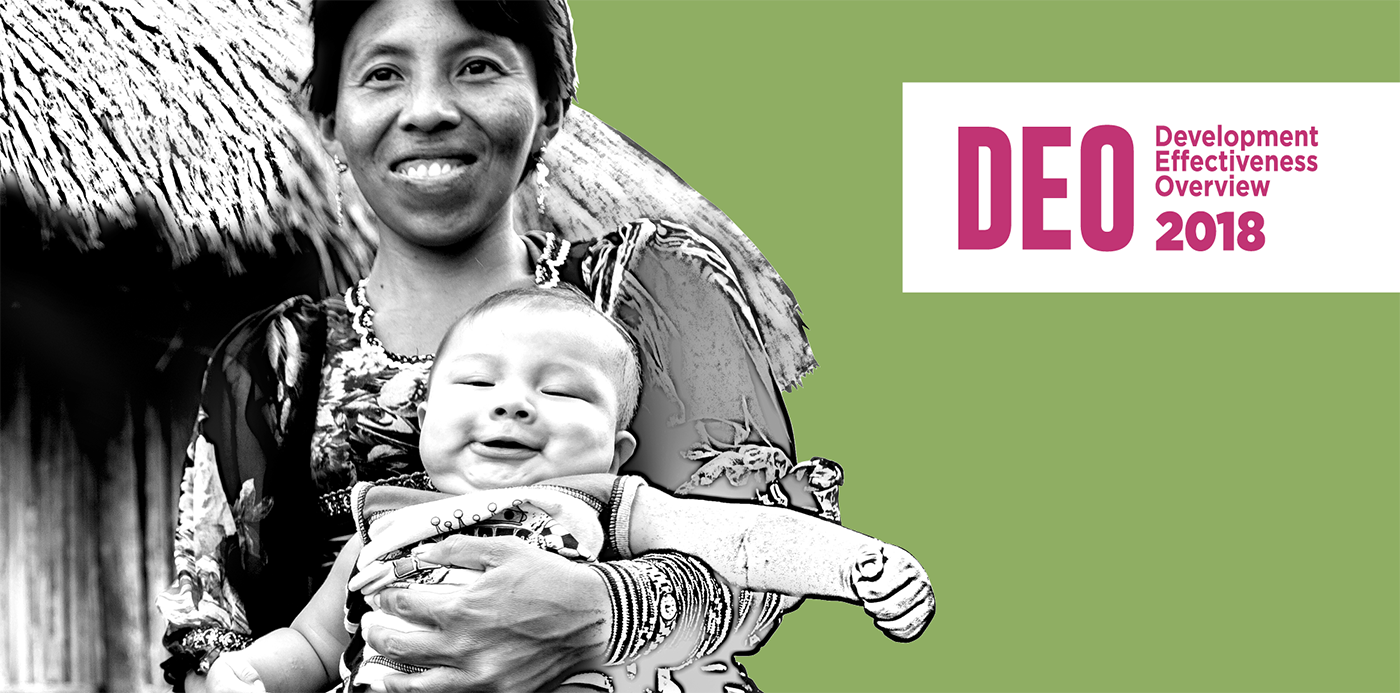 The 2018 Development Effectiveness Overview (DEO) is a testimony to that old saying “What gets measured gets done.”
The 2018 Development Effectiveness Overview (DEO) is a testimony to that old saying “What gets measured gets done.”
In its reflection of changes taking place globally, at the regional level and internally across the IDB Group (IDBG), it mirrors not only decisions that were taken in ministries across the region, in offices at the IDBG but also at the level of our field projects. As the world around us evolves, so too does the way we reflect on the development impact we make in the region.
The DEO reflects a new development landscape
We live in an interconnected world where the proliferation of new technologies, digital platforms and big data can propel development solutions further and faster. New actors are entering the development landscape and new technologies and business models are accelerating the rate of global change.
At the same time, by setting the Sustainable Development Goals (SDGs) for 2030, the international development community has agreed to work towards improving lives of millions of people while also protecting the planet. Leading businesses are embracing these goals and the Paris Agreement on climate change, not only as a responsibility, but as a roadmap to potential market opportunities worth up to $12 trillion.
In 2016 and 2017, the IDBG stepped up its efforts to support countries and clients in implementing the SDGs. Over those two years, IDBG projects in execution supported 9.4 million individuals with access to health services, 970,000 micro, small and medium enterprises with financing, 800,000 farmers with improved access to agricultural services, 600,000 women through economic empowerment initiatives, and 470 subnational governments with citizen security projects, among other results. At a project level, these results are expected to lead to a wide range of outcomes – from a reduction in maternal mortality and an increase in economic growth and innovation to an improvement in sustainable agriculture and a reduction in crime rates.
Despite these results, meeting the SDG targets in the region by 2030 will be no small challenge. To rise to the occasion, the IDBG must continue to innovate and harness the tools at its disposal. The IDBG needs to be ready to respond to evolving circumstances by leveraging new technologies and reflecting on lessons learned.
Here is some food for thought.
- Innovation
The IDBG has been investing in innovation and productivity to devise new solutions to long-standing problems across the region. IDB Invest, the IDBG’s private sector arm, has been working to close gaps in broadband connectivity in Argentina and Paraguay while supporting access to innovative financial loan products for medium-sized firms in Mexico. At the same time, the Multilateral Investment Fund (MIF), the IDB’s innovation lab has been harnessing the power of robotics in Panama and is helping to provide seed capital to tech-driven social enterprises in Uruguay.
- Big data
There is also room for innovation in how development projects are evaluated. One cost-effective way of ensuring accuracy in project evaluations is by accessing the wealth of information provided by big data. Today, satellite images provide ever-increasing access to big data that can be incorporated into evaluations of projects related to urban planning, deforestation, or climate change. Did you know that they can even provide us with GDP estimates down to one particular beach? If the IDBG truly harnesses the potential of big data, it could revolutionize the accuracy of its evaluations, which could then translate into better designed projects.
- Knowledge and accountability
The IDBG Development Effectiveness Framework (DEF) is celebrating its 10th anniversary. It includes a set of tools, which have contributed to more effective project design, monitoring and evaluation. But the DEF is more than a simple accountability tool. It is a knowledge tool as well.
The DEF tools have allowed to identify the reasons why sometimes projects have not been successful. Some of those reasons are lack of institutional support, problems with the project design or unanticipated external factors. In all cases, these failures serve as contributions to our knowledge tank. In this sense the DEF is a tool for accountability but also a means to learn and improve, as recognized by the Multilateral Organization Performance Assessment Network.
- An IDB Group effort
The IDBG has renewed its efforts to offer a more integrated response to development challenges in the 21st Century. In its third year of operation, IDB Invest has solidified its portfolio approach, balancing development impact and financial sustainability. Likewise, the MIF has a renewed mandate to strengthen its role as the Group’s innovation lab. The DEO 2018 is a reflection of how we are bringing to bear the collective strengths and complementary capabilities of the IDBG’s public, private, and innovation laboratory functions to address the region’s spectrum of development needs, while offering value for money to our stakeholders.
The DEO is all this and more. We hope you enjoy the read!


Leave a Reply